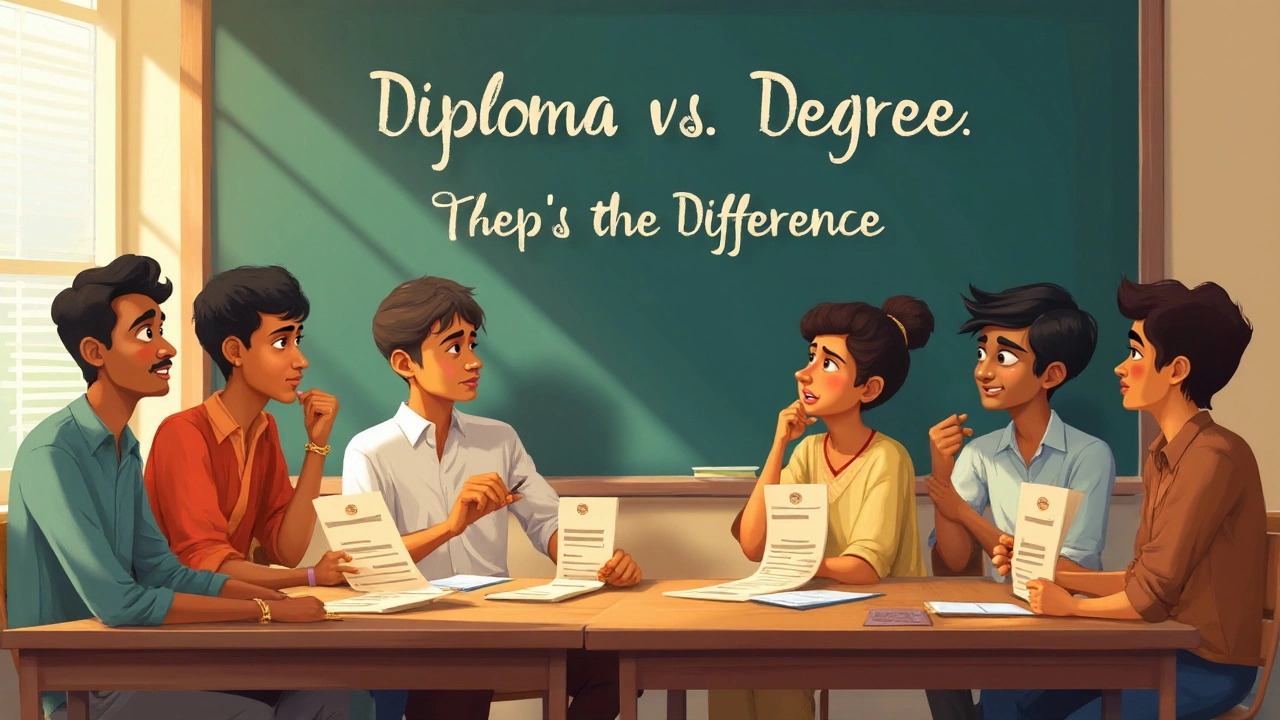
Walk into any Indian classroom and you’ll find plenty of students confused about the whole diploma versus graduate business. Is a diploma holder a graduate? Can you write “graduate” next to your name if you finished a diploma course? If you’re hunting for jobs or thinking about applying for more studies, this isn’t just an academic question—it can decide your future. It’s time we cleared this up for good, so you’re not left guessing or, worse, making a mistake that costs you opportunities.
What Does ‘Graduate’ Mean in India’s Education World?
Here’s the straight answer: In India, being a “graduate” almost always means you’ve completed a bachelor’s degree at a recognized university or college. This usually means a BA, BSc, BCom, BTech, or similar three- or four-year degree after your 12th standard (that’s class XII or HSC, for those keeping track). Diplomas? They’re not the same, at least not in the eyes of universities, government jobs, or even most private recruiters.
Let’s break it down. Graduation is the step just after finishing your higher secondary education. It’s a full-fledged academic degree, with minimum duration fixed by the University Grants Commission (UGC). Bachelor’s degrees usually last three years (arts, science, commerce) or four years (engineering). The UGC, AICTE (for technical courses), and other bodies make it crystal clear—these are what you call “graduation.”
Diplomas, on the other hand, are short-term, skill-oriented academic courses. They can last one year, two years, or even three years (like polytechnic diplomas). But unless specifically called a “degree,” it doesn’t count as graduation. So, if you are holding a diploma in civil engineering from a polytechnic, you can’t call yourself a “civil engineering graduate”—not unless you go for a lateral entry and complete a BE or BTech after your diploma.
Why does this matter? Recruitment ads, government forms, scholarship criteria—all these ask for “graduates” or specify “graduation.” If you only have a diploma, you’ll get filtered out in many cases. That’s the harsh truth that often surprises young Indians after they spend years studying.
If the terms sound muddled, you're not alone. Even tech institutes sometimes use confusing labels like “diploma degree.” But according to the official rulebooks, if the word “degree” isn’t in your final certificate, you’re not a graduate. Read that last bit again if you’re thinking about your CV or job applications.
How Are Diploma Courses Structured?
Diploma programs in India come in all shapes and sizes. Most commonly, you’ll see these courses after 10th standard (known as post-matric) or after 12th (post-HSC). The classic example is the three-year polytechnic diploma in engineering fields. There are also shorter diplomas—like a one-year computer application course, a six-month medical lab technician program, or even specialized hotel management diplomas.
What do these diplomas have in common? They’re hands-on, skill-heavy, and designed to get you job-ready quickly. Unlike traditional degree courses—which dip into theory, history, and general knowledge in addition to skills—diploma courses focus on what you’ll actually *do* in the workplace.
Here are a few key points about diploma courses in India:
- They’re usually run by technical education boards (like DTE, BTE) or autonomous institutes.
- The duration ranges from six months to three years, depending on the field and whether you start after 10th or 12th.
- Polytechnic diplomas (post-10th, three years) are super popular in fields such as electrical, mechanical, and civil engineering.
- Medical, hospitality, design, and even law and management fields offer diplomas.
- Many diplomas offer a ‘lateral entry’ option, letting you jump into the second year of a degree course (called “BE/BTech second-year direct admission”).
- They tend to cost a lot less than full-fledged degrees and can be finished faster.
Here’s a quick look at how diploma vs degree courses compare in key areas:
| Parameter | Diploma | Degree (Graduation) |
|---|---|---|
| Duration | 6 months to 3 years | 3 to 4 years |
| Eligibility | 10th or 12th pass | 12th pass (often with specific subjects/marks) |
| Recognition | Boards, Autonomous Institutes | University Grants Commission (UGC), AICTE, etc. |
| Career Scope | Entry-level jobs, technical positions | Professional jobs, higher posts, eligibility for post-grad |
| Post-Course Options | Lateral entry to degree, or start working | Postgraduate studies, research, better job roles |
The upshot here? A diploma can open doors, especially if you want a faster and more budget-friendly route into certain careers. But when you stack it against a degree, it doesn’t quite give you the same recognition, pay, or long-term prospects—unless you move up with further studies.

What Do Jobs and Universities Want: Diploma or Graduation?
If you’re sweating about jobs or advanced studies, this part matters most. For a whole lot of career options, the minimum eligibility is “graduation” or “bachelor’s degree.” And this isn’t just fine print—this is the first filter in job portals, government recruitment, private MNCs, and even study-abroad programs. Here’s where the difference swings from academic debate to real-world impact.
Let’s say you want to sit for most government exams (UPSC, SSC, State PSCs, banking, teaching, railways—the lot). They almost always have “graduate from a recognized university” on the form. No way around it: holding a diploma only gets you in for technical assistant or technician categories, not officer or manager posts. You’ll want that degree certificate if you’re dreaming of higher-level government jobs.
Private sector? While some tech and factory jobs happily accept diploma holders (especially in fields like engineering, design, hospitality), the HR departments of most companies follow a similar script—bachelor’s degree for higher-level roles. Many MNCs filter applications using “minimum education bachelor’s degree,” so even a strong diploma can get your profile auto-rejected. The same happens if you want to do an MBA, study abroad, or work in another country. Universities across the world usually demand a bachelor’s degree for postgrad admissions. Diplomas—even advanced ones—won’t cut it unless they’re designed as “graduate diplomas,” which in India is rare and often misunderstood.
This gets really important if you’re planning your career in tech. For example: Indian IT companies, and companies abroad, almost always require a degree in engineering (BE/BTech/BSc Computer Science) for developer or analyst roles. Diplomas can set you up for support, technician, or operator positions, which often have lower pay and less room for promotions unless you move up the academic ladder.
Here are a few quick tips for maximizing your diploma:
- Always check the minimum qualification for your dream job—if it says “graduate,” know that diploma alone usually won’t be enough.
- If you’ve completed a technical diploma, explore lateral entry options into degree programs; you might only need two more years for that golden degree!
- Government jobs often have technical sleeves (like Junior Engineer, Lab Assistant) open for diploma holders, so watch those notifications closely.
- If you have a diploma and are planning to go abroad (like Australia, Canada, or the UK), research thoroughly—some countries recognize Indian diplomas for job purpose, but not for further academic qualification. Each country is different!
- Some private Indian universities offer “diploma-to-degree” programs, which let working professionals get a degree based on their prior diploma—these are worth checking out.
At the risk of repeating myself (because it matters): if a form or official ad says, “Graduation required,” a diploma by itself won’t make the cut. You need a recognized bachelor’s degree.
Should You Do a Diploma? Weighing Pros and Cons
So, is a diploma “useless” if it isn’t graduation? Not at all. In the real world, diplomas have set up millions of Indians with solid, practical careers. Plumbers, electricians, medical lab technicians, graphic designers—these fields run on skilled people who often get there through diplomas instead of degrees. If you’re itching to start earning sooner or want to skip the long grind of a full-blown degree, a diploma is a smart choice.
But, you have to be mindful of its limits. For better pay, promotion, and mobility in most traditional careers, a degree (a real graduation) holds weight. If you think you might want to move into management later, or try for government officer exams, or even move abroad for an IT job, a degree is often a must-have. No amount of workplace experience sometimes makes up for it in the eyes of HR.
What’s not talked about enough is how some industries give a real edge to diploma holders. For example, in Indian Railways, junior engineers usually come from diploma backgrounds, and thousands are recruited every year. Technicians in government hospitals or technical assistants in labs? Again, many start with diplomas. Polytechnics and ITIs often have the best campus placement rates among all technical schools, especially in smaller towns and tier-2 cities.
Here’s a quick table showing common jobs and typical eligibility:
| Career/Job Title | Eligibility | Typical Employer |
|---|---|---|
| Junior Engineer (Railways, PSU) | Diploma in Engineering | Railways, State/PSU |
| Assistant Sub-Inspector (Police Tech) | Diploma (Electronics/Communication/IT) | State Police |
| Project Supervisor/Technician | Diploma | Private Firms, Labs |
| Engineer (Core/IT/Fields) | Bachelor's Degree (BE/BTech/BSc) | MNCs, Large Tech |
| Officer (UPSC/SSC/Bank Jobs) | Bachelor's Degree | Govt/Semi-Govt |
If you’re considering what to pick, ask yourself:
- Do you want to learn practical, job-oriented skills and maybe start working earlier?
- Are you aiming for core government jobs or higher-paying managerial posts in the future?
- Is your chosen industry open to diploma holders, or do they ask for graduate degrees?
- Will you want to move abroad or get a master’s degree later?
There’s actually a smart way to blend the two. Take that diploma, use it for a job and experience, and then—if you need it—upgrade to a degree through lateral entry or distance modes. Institutions like IGNOU, NIOS, and even some state open universities offer such options, and they’re increasingly recognized by employers (as long as the UGC or AICTE backs them). Just don’t get taken in by fake institutes; always check the official recognition before enrolling.
So when someone asks you, “Is diploma a graduate qualification in India?” you’ve got the inside scoop. It’s not, but that doesn’t make it useless or second-class—just a different step on the education and career map. Get your goals clear and choose your path wisely. The Indian system can be complicated, but if you have the facts, you’ll never be caught off guard.
